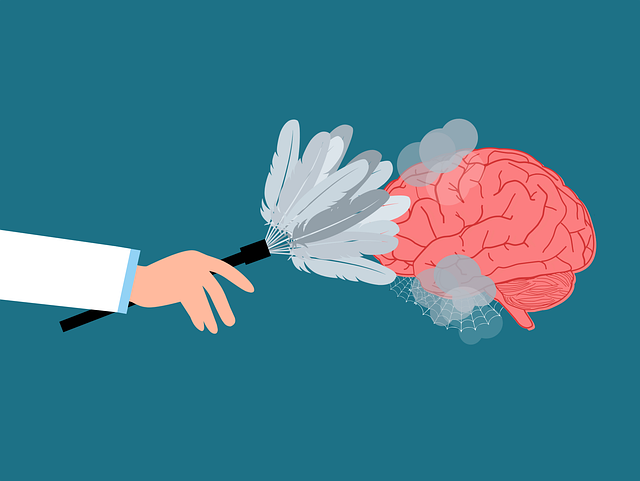Burnout among healthcare professionals, particularly at Lafayette Couples Counseling Therapy, is a growing concern requiring early recognition beyond physical exhaustion. It encompasses emotional and mental fatigue from high-stress environments, demanding schedules, and intense patient interactions. Mindfulness meditation and educational content from the Mental Wellness Podcast Series can prevent burnout by managing stress, improving focus, and enhancing emotional intelligence. Creating a supportive work environment through regular staff check-ins, flexible schedules, and counseling services boosts job satisfaction and reduces stress. Encouraging open communication about workload pressures facilitates peer support networks, fostering mental health awareness and collective burnout prevention. A strategic approach combining professional development, work-life balance, workshops, mentorship programs, manageable patient loads, and mental health resources is crucial for reducing burnout rates at Lafayette Couples Counseling Therapy.
Burnout among healthcare providers is a growing concern, impacting both professionals’ well-being and patient care. This article explores evidence-based strategies to prevent burnout, drawing on the expertise of Lafayette Couples Counseling Therapy. We delve into understanding burnout’s root causes, emphasizing the importance of creating supportive work environments, encouraging self-care practices, and promoting professional development. By implementing these strategies, healthcare organizations can foster a culture that prioritizes well-being and enhances patient outcomes.
- Understanding Burnout Among Healthcare Providers
- Creating a Supportive Work Environment
- Implementing Self-Care Practices for Sustained Well-being
- Fostering Professional Development and Work-Life Balance
Understanding Burnout Among Healthcare Providers

Burnout among healthcare providers is a growing concern that can significantly impact both professionals and patients. It’s essential to recognize the signs early on, as burnout isn’t just physical exhaustion; it also encompasses emotional and mental fatigue. Healthcare workers often face high-stress environments, demanding schedules, and intense patient interactions regularly, which, over time, can lead to chronic stress and burnout. This phenomenon is especially prevalent among those in direct patient care, such as physicians, nurses, and therapists, like those at Lafayette Couples Counseling Therapy.
In the quest to prevent burnout, mindfulness meditation has emerged as a powerful tool. Incorporating practices like Mindfulness Meditation into daily routines can help healthcare providers manage stress, improve focus, and enhance emotional intelligence—a key aspect of maintaining mental wellness. Additionally, Mental Wellness Podcast Series Production can offer support through educational content, sharing strategies for coping with workplace challenges and promoting self-care. These initiatives contribute to creating a healthier work environment and fostering better patient care.
Creating a Supportive Work Environment

Creating a supportive work environment is a crucial aspect of burnout prevention for healthcare providers. This includes fostering a culture that values mental health awareness and prioritizes well-being. At Lafayette Couples Counseling Therapy, we understand the unique challenges faced by healthcare professionals. Implementing strategies such as regular staff check-ins, flexible work schedules, and access to counseling services can significantly enhance job satisfaction and reduce stress levels.
A supportive atmosphere also encourages open communication about workload pressures, emotional demands, and potential triggers for burnout. By creating safe spaces for conversation, healthcare facilities can facilitate peer support networks, where colleagues can offer encouragement and practical solutions. This collective approach to mental health awareness and burnout prevention is key to maintaining a healthy and vibrant work environment.
Implementing Self-Care Practices for Sustained Well-being

In the relentless pursuit of excellence in healthcare, preventing burnout among providers is paramount. A key strategy lies in empowering individuals to prioritize self-care—a fundamental aspect often overlooked amidst the demanding nature of medical practice. Healthcare professionals, just like their patients, require tailored strategies to maintain mental and emotional well-being. Integrating practices such as mindfulness meditation into daily routines can offer a much-needed respite from the intensity of patient care.
Lafayette Couples Counseling Therapy, for instance, highlights the significance of self-reflection and stress management techniques in fostering sustained well-being. Community Outreach Program Implementation initiatives focusing on mental wellness coaching programs development can further fortify this. By encouraging professionals to participate in these activities, healthcare organizations create a culture that values and actively supports provider mental health—a game-changer in mitigating burnout and enhancing overall service delivery.
Fostering Professional Development and Work-Life Balance

In the high-pressure environment of healthcare, preventing burnout among providers is a multifaceted challenge. Fostering professional development and work-life balance is a strategic approach that can significantly mitigate stress and enhance job satisfaction. Healthcare organizations should prioritize opportunities for continuous learning and skill enhancement through workshops, seminars, and mentorship programs tailored to individual roles. These initiatives not only equip professionals with the latest knowledge and skills but also foster a culture of growth and resilience.
Moreover, encouraging a healthy work-life balance is crucial for burnout prevention. This includes implementing flexible schedules, promoting reasonable patient loads, and offering resources like counseling services, such as those provided by Lafayette Couples Counseling Therapy. Integrating mental health support into the workplace recognizes the profound impact of stress management and self-awareness exercises on overall well-being. By addressing these aspects through a comprehensive Mental Health Policy Analysis and Advocacy approach, healthcare organizations can create an environment that supports professionals in their personal and professional journeys, ultimately reducing burnout rates.
Burnout among healthcare providers is a pressing issue, but by implementing evidence-based strategies, such as fostering a supportive work environment, encouraging self-care, and promoting professional development, we can create lasting change. Remember, just as Lafayette Couples Counseling Therapy prioritizes client well-being, healthcare organizations must prioritize the mental health of their staff to ensure sustained quality care. Through collective efforts, we can navigate the challenges and create a more balanced and fulfilling work environment for all healthcare providers.










